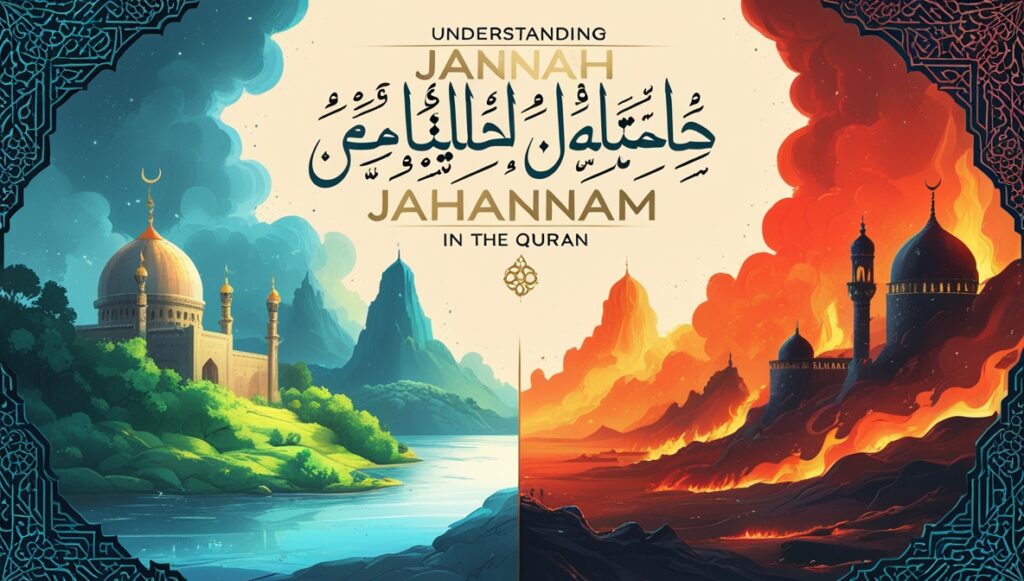The Quran speaks deeply about Jannah and Jahannam, the two eternal destinations of the soul after death. Jannah represents ultimate peace, joy, and reward, while Jahannam symbolizes punishment, regret, and distance from mercy. These two places are not just metaphors; they are real and everlasting worlds described by Allah to remind people of the purpose of life.
Jannah, often translated as Paradise, is a place filled with endless happiness and blessings. Jahannam, known as Hell, is a place of pain and suffering for those who reject truth and act unjustly. Understanding both helps believers live a life of balance—filled with hope in Allah’s mercy and fear of His punishment.
Jannah: The Eternal Reward
Description of Jannah in the Quran
The Quran describes Jannah as a garden beneath which rivers flow, filled with fruits, shade, and beauty beyond imagination. The people of Jannah will live there forever, free from sadness, sickness, or death. They will be welcomed by angels and greeted with words of peace.
Allah says in the Quran, “Indeed, those who believe and do righteous deeds will have gardens beneath which rivers flow…” (Surah Al-Baqarah 2:25). This shows that Jannah is a reward for faith and good deeds. Every act of kindness, every prayer, and every moment of patience adds to one’s path toward Jannah.
The People of Jannah
The people who enter Jannah are those who sincerely believed in Allah, followed His guidance, and lived with compassion. They controlled anger, forgave others, gave charity, and stood firm in their faith. They will wear garments of silk, eat from golden plates, and never feel hunger or fear again.
The Quran also reminds that Jannah is not only for prophets or saints but for anyone who strives for righteousness, regardless of status or wealth. This gives every believer hope that with sincere faith and good actions, they too can enter this eternal home.
Jahannam: The Place of Consequence
Description of Jahannam in the Quran
While Jannah is full of joy, Jahannam is the opposite—a place of fire, thirst, and regret. The Quran describes Jahannam as a deep pit where its residents face the results of their deeds. Allah says, “And fear the Fire whose fuel is men and stones, prepared for the disbelievers.” (Surah Al-Baqarah 2:24).
The descriptions of Jahannam are meant to awaken the heart. They serve as a warning against pride, injustice, and disbelief. It reminds us that every action has a consequence and that Allah’s justice is perfect.
The People of Jahannam
The people of Jahannam are those who denied Allah, hurt others, or refused to repent even after being reminded. They ignored guidance, followed their desires, and turned away from mercy. The Quran mentions that they will say, “If only we had listened or reasoned, we would not be among the companions of the Blaze.” (Surah Al-Mulk 67:10).
This shows that Jahannam is not about punishment without reason—it is about accountability. Every person is given choices and chances throughout life. Jahannam is the result of knowingly rejecting those chances.
The Balance Between Hope and Fear
Living with the Reminder of Jannah and Jahannam
The purpose of learning about Jannah and Jahannam is not just to imagine the afterlife but to guide our daily life. When a person remembers Jannah, they find motivation to do good. When they remember Jahannam, they stay away from sin.
The Quran often mentions both together because faith needs both hope and fear. Hope keeps the heart soft and motivated, while fear keeps it humble and cautious. A believer should never lose hope in Allah’s mercy but also should never feel safe from His justice.
The Path to Jannah
The path to Jannah is built on faith, prayer, kindness, and forgiveness. It is about helping others, being honest, and asking for forgiveness from Allah. Even a small act, like smiling at someone or feeding the poor, can be a step toward Jannah.
Avoiding the Path to Jahannam
To avoid Jahannam, one must avoid injustice, arrogance, and harm to others. The Quran teaches that repentance is always open. No matter how many sins a person has committed, turning back to Allah with a sincere heart can erase them all. Allah’s mercy is greater than any sin.
Lessons from Jannah and Jahannam
The lessons of Jannah and Jahannam are powerful reminders of life’s true purpose. This world is temporary, filled with tests and choices. The Quran encourages believers to seek the next life by living with kindness, patience, and sincerity.
Jannah teaches us about the beauty of faith and the joy of eternal peace. Jahannam reminds us of accountability and the seriousness of ignoring truth. Together, they create a balance that helps believers stay on the straight path.
Every verse about Jannah brings comfort to the heart, while every verse about Jahannam shakes the soul awake. Both are meant to help us build a life worth living and an afterlife worth entering.
Wrapping Up!
Jannah and Jahannam are not just destinations but reflections of our choices in this world. The Quran calls us to live a life of purpose, faith, and compassion. By remembering Jannah, we find peace and hope. By remembering Jahannam, we stay aware and responsible.
Let these reminders inspire us to pray more, forgive more, and love more. Each good deed brings us closer to Jannah, and each act of repentance removes a step toward Jahannam. Life is short, but the next life is forever. Choose wisely, and live with the goal of earning Allah’s pleasure.
To learn more about faith, the afterlife, and living a guided life, connect with NAIF Center—a place that helps you grow spiritually and understand Islam with clarity and love.

